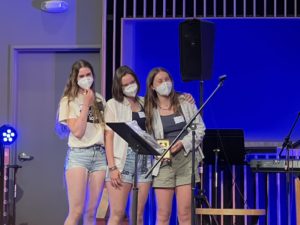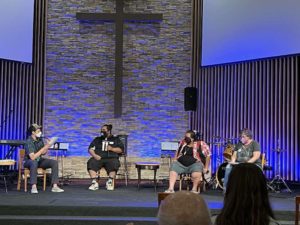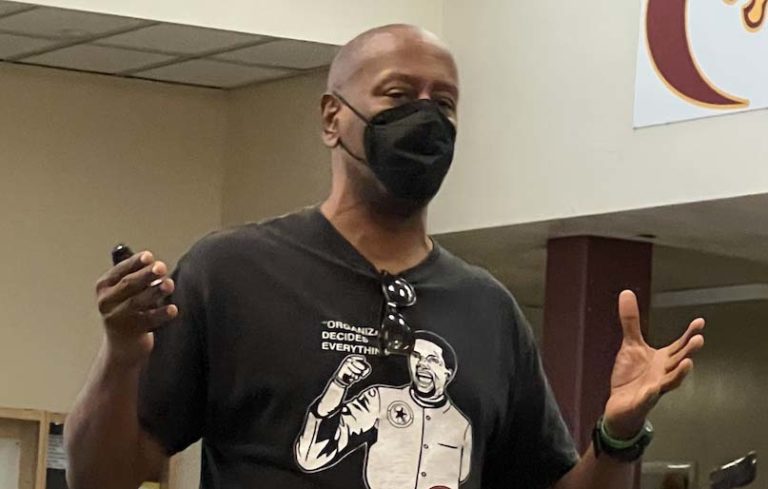by Kerul Dyer
Pictured, above: Ahjamu Umi presents compelling analysis and instruction for participants of the 2022 Rural Organizing Project Caucus.
Peace House joined other member groups of the Rural Organizing Project at their annual statewide Caucus last weekend, where more than 100 community leaders gathered in a COVID-safe environment in Central Oregon to celebrate victories and discuss strategies for the future. A diverse and energized group watched on as Ashland’s own youth-led Truth to Power club received a Dignity Award for their innovative social activism that combines independent journalism with service projects.

The two-day event included workshops on reproductive justice, local governance, community media, disability justice and a segment on “dissecting institutional racism.” I proudly represented Peace House and Uncle Food’s Diner, and connected with dozens of activists working in rural areas on immigrants rights, access to food, shelter, and services, campaigns for police accountability, and courageous work of improving accessibility to better include people of all ability levels. I learned about major victories, including a multi-faceted campaign that ended contracts with ICE at county jails and the critical work of holding local city councils and school boards accountable through the creative use of videos and social media.
To represent the aims of Peace House’s anticipated new area of program work, to counter white supremacy and challenge hate groups in our region, I attended three sessions facilitated by the esteemed Ahjamu Umi, a former labor union representative, author, and organizer with All African People’s Revolutionary Party. Ajhamu’s first presentation laid out a path to creating a safe space for marginalized people to demonstrate without fear of violence through coordinated communication, fulfilling key roles, and rehearsal of scenarios. His hardest-hitting workshop tugged at the wrangled knot of embedded racism in American culture. To this end, Ahjamu examined the facts, and showed evidence that modern institutions of capitalism like banks and insurance companies were made possible by transatlantic trading of slaves and widespread land theft from Indigenous communities.
 During this weekend’s Caucus, I saw proof that Rural Organizing Project organizers support building bigger and stronger networks to “take care of each other, build people power, and dismantle structures of injustice, even during public health, climate, and economic crises.” We look forward to deepening our solidarity work with organizations in Corvallis, Pendleton, Cottage Grove, and Roseburg. Stay tuned to get involved!
During this weekend’s Caucus, I saw proof that Rural Organizing Project organizers support building bigger and stronger networks to “take care of each other, build people power, and dismantle structures of injustice, even during public health, climate, and economic crises.” We look forward to deepening our solidarity work with organizations in Corvallis, Pendleton, Cottage Grove, and Roseburg. Stay tuned to get involved!
Kerul Dyer authored this report back and can be reached at editor@peacehouse.net. Thanks for reading!


